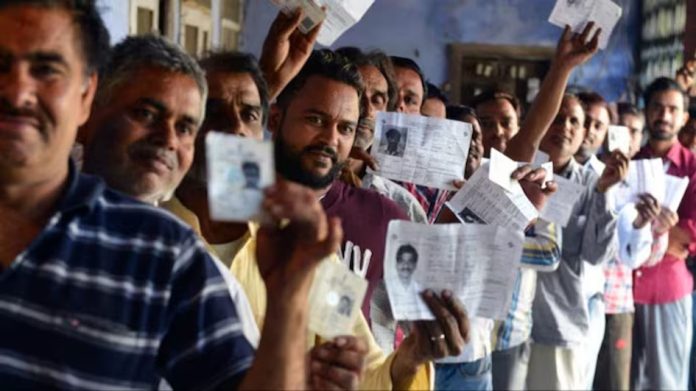Anil Anand
It is never easy to comprehend things when it comes to elections in Jammu and Kashmir. More so when assembly elections are being held, first in the newly created Union Territory, after gap of a decade and in the aftermath of Constitutional changes of far-reaching dimensions. These changes which have impacted not only geographically but psychologically as well, as people of two regions- Jammu, and Kashmir are still trying to come to terms with the new arrangement.
The three-phase election schedule announced by the Election Commission of India recently is in line with the deadline set by the Supreme Court. In response to a bunch of petitions filed before it challenging the Abrogation of Article 370, which gave special status to the erstwhile state of Jammu and Kashmir, on August 5, 2019 the apex court had directed holding of election before September 30, 2024. And also granting back the statehood “as soon as possible”.
Every election in the strategic and sensitive Jammu and Kashmir is pregnant with probabilities and possibilities of a different kind given its sordid electoral history. And the current assembly election is no different. It is loaded with surprises as never before.
The obvious focus is on Kashmir Valley which has come out of three-decades of militancy to a semblance of normalcy. However, the new spate of militancy in the higher regions of Jammu region pose a fresh challenge for peaceful conduct of the elections.
How do the alliances are formulated and work on ground? There are some open combines and there are going to be some tacit ones.
The first significant step towards this direction is the declaration of an alliance among Congress, Dr Farooq Abdullah’s National Conference and CPM. It was formulated after a surprise visit by Congress president Mallikarjun Kharge and Leader of Opposition in Lok Sabha Rahul Gandhi to the Union Territory.
On paper it is an I.N.D.I.A bloc alliance. In reality, it is not so as another important opposition combine partner Peoples Democratic Party (PDP)-led by Mehbooba Mufti has been kept out. It is due to local turf war and political compulsions that Dr Abdullah has managed to prevail upon the Congress to keep PDP out. He has taken the advantage of National Conference being a dominant force in Kashmir and with pockets of influence even in Jammu region where BJP has been holding total sway for the past decade.
Ideally speaking a strong and united I.N.D.I.A bloc should have been in a better position to challenge the might of the BJP which is not only trying to maintain its dominance in Jammu, but also exploring new avenues, direct and indirect, to make the saffron party’s presence felt in the Muslim dominated Kashmir where it exists only symbolically. On the unity front Dr Abdullah and Congress leadership should have been guided by the fact that his son and National Conference vice-president Omar Abdullah was convincingly humbled by jailed separatist Engineer Rashid, who is emerging as a new political force in Valley, and that Congress, despite a favourable environment created by Mr Gandhi’s ‘Bharat Jodo Yatra’ and some local factors lost both the seats in Jammu region. This despite securing more votes than in 2019 Lok Sabha polls.
All elections in Jammu and Kashmir weigh heavily on regional dimensions and the current assembly elections are no different. It is another matter that these regional streaks have been somewhat blurred after the August 5, 2019 abrogation of Article 370 and there is concurrence on certain issues such as granting back the statehood, protection of land and employment rights, and of course, on matters related to bread and butter.
The battlelines are clear in Jammu region, which though Hindu majority but with heterogenous mix of population, with a BJP versus I.N.D.I.A combine contest on the cards. The Congress despite being organizationally weak and struggling to loosen the stranglehold of old-guard coterie to field new and credible faces, is the dominant partner.
The Engineer Rashid phenomenon, in a surprise move he was able to file his nomination for Baramulla Lok Sabha seat from Tihar Jail, evoked public sympathy particularly among youth to defeat Mr Omar Abdullah, is the focus of debates in the political and social circles. Will this phenomenon replay in the assembly elections which will be fought more on local than national issues?
Moves are already afoot in this direction. Engineer Rashid’s nascent Awami Ittehad Party has already released first list of its candidates, giving representation to parts of the Valley other than North Kashmir which is his home ground and also contains his assembly segment. This is a clear indication that his supporters are eyeing a bigger piece of the pie after registering an unprecedent victory in Lok Sabha.
Another significant development and which has the potential to spring an even big surprise and pose a bigger challenge to Dr Abdullah dominated opposition in Kashmir Valley, is the possibility of the separatist and hardcore Jamaat-e-Islami entering the election fray. Mr Ghulam Qadir Lone, head of the eight-member committee looking after the organizational work of the Jammat has declared the outfit’s willingness to enter electoral fray.
Interestingly, while Engineer Rashid is in jail facing charges of money laundering under Unlawful Activities (Prevention) Act (UAPA), the Jamaat Islami was also banned by the Centre in 2019 under the same stringent law. The ban on the Jammat was for allegedly supporting militant activities.
The separatist outfit contesting assembly elections will entail lifting the ban as also releasing some of its jailed leaders. So will be the case of Engineer Rashid who has already moved a bail application before a Delhi Court.
It is obvious that it cannot happen without the facilitation of the ruling dispensation in Delhi. How will the BJP-led Central Government and the BJP as a political party pursuing hardcore “nationalist agenda”, be seen in this entire gamut of electoral management? It is a significant question in the context of Jammu and Kashmir assembly election.


